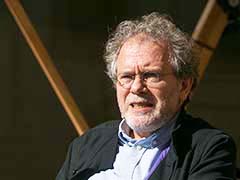When the lonely task of the writer comes to an end, when the book is published and is being distributed, this is, for Georges Didi-Huberman, a moment when public space comes into being.
Georges Didi-Huberman speaks about public space from his experience as a writer. His working space is the desk where the gestation of the book slowly matures as the fruit of solitary work. At the same time, this is solidary work since it is devoted to everyone with the final aim of becoming a public object. The moment when this task carried out in solitude is published, circulated and made accessible to everyone is, for Didi-Huberman, the moment of generating public space.
Speaking of public spaces with a special meaning, Didi-Huberman highlights bookshops because, together with libraries, they are true social spaces of books. In particular, he draws attention to the bookshop La Central in the Barcelona neighbourhood of El Raval since it brings together books in different languages. And it is this multilingualism which transforms the bookshop into an exemplary space of open-mindedness. Didi-Huberman suggests that public space is not only somewhere for people to meet and recognise each other in their identities, but also the place in which, starting out from this meeting a person can address others and be open to them.



